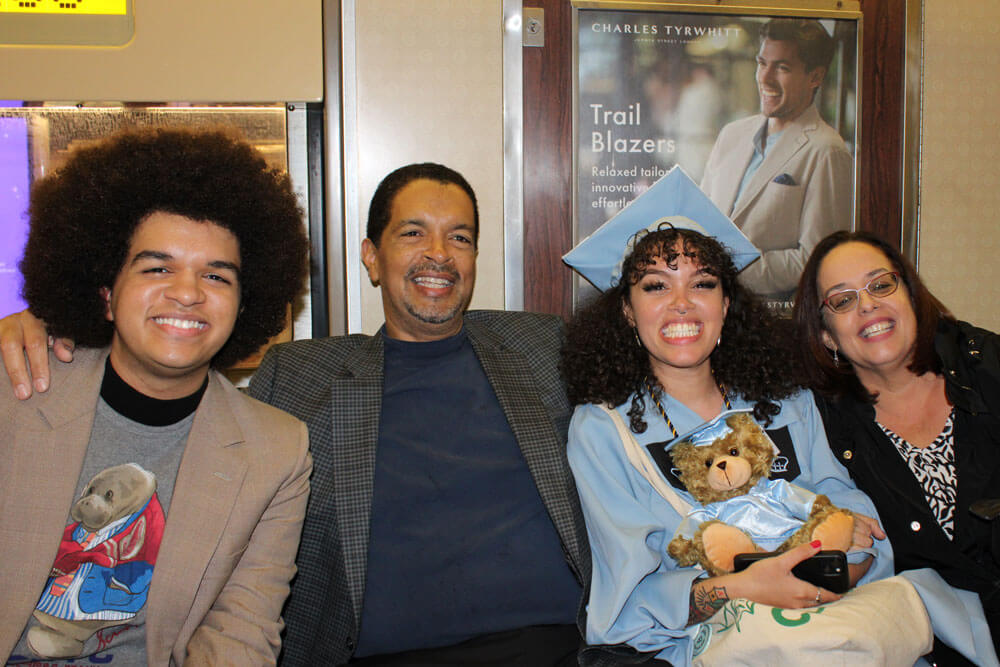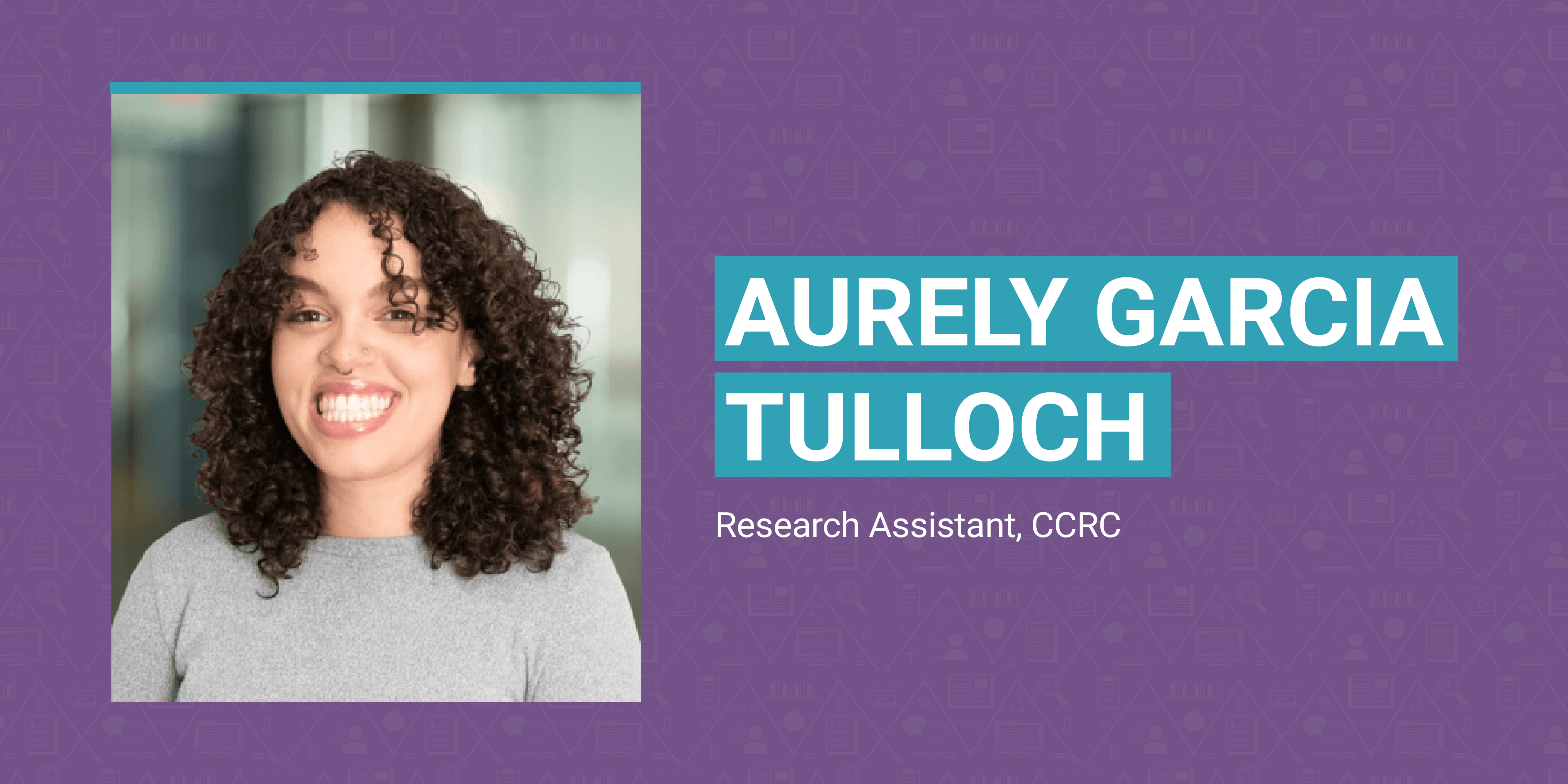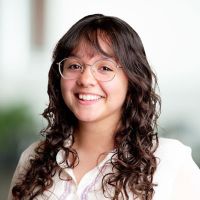This story is part of a series on how the lives of CCRC staff members influence their research. Find earlier posts using the Inside CCRC tag on the CCRC blog.
Aurely Garcia Tulloch was covered in flour from the dumplings she was helping her grandmother make when the admission decision from Teachers College lit up her phone.
She had been accepted to the Higher and Postsecondary Education master’s program at Columbia University’s graduate school of education.
She and her family were stunned—after all, Teachers College had been her reach school. But Tulloch was also saddened because she figured she could never afford the price tag on the prestigious program.
The high price of education weighs heavily on Tulloch’s mind as a higher education researcher. Having completed her own undergraduate degree at no cost through a high school program that allowed students to dual enroll in a local community college and helped facilitate transfer to a four-year college, Tulloch counts herself lucky. The program accelerated the standard middle and high school curricula so that students could complete required courses by the end of their sophomore year and focus entirely on their associate degree through State College of Florida for the final two years of high school. But she recognizes that her story is not universal.
“People don’t know how to read the fine print,” she said of students looking at higher education options. “It actually ruins my day when I hear people going into debt over school because they don’t know their options. It makes me angry. How can I get the knowledge that they put in the fine print to the masses? Because we wouldn’t know. How do you know if no one tells you?”
Tulloch’s success in avoiding student debt throughout her undergraduate years made her more willing to take on the high cost of the Ivy League master’s program. She knew the credential would not only open doors for a career in higher education but also promote upward mobility for her and her family. The child of Jamaican- and Puerto Rican-born parents, Tulloch traces her passion for higher education back to them, as they encouraged her from a young age to decide on a career path and work toward it.
 Tulloch and her brother representing their Jamaican heritage.
Tulloch and her brother representing their Jamaican heritage.“The day I was born—according to them—they were like, ‘You have to go to college,’” said Tulloch, who grew up in Florida. “My dad always said that by the time I was thirteen, I needed to know what I wanted to do with my life.”
Earning college credit while in high school was helpful to Tulloch since her family could not assist with the costs. But Tulloch, who is now researching dual enrollment at CCRC, points out that while we tend to focus on the benefits of dual enrollment, the lived experience of these students is often overlooked.
“There’s not enough research on what dual enrollment students are thinking about,” she said. “They’re taking the classes, listening to their parents, but what are they thinking? I wish someone had asked me that. You don’t think about the social interactions that dual enrollment students have on a community college campus.”
Tulloch, who completed her associate degree from State College of Florida while in high school and her bachelor’s from Florida Gulf Coast University by age 19, observed that her peers were often much older students.
“There’s a disconnect, and I think it has to do with the fact there’s no focus on the transfer student experience,” she said. “I don’t think I made any friends after transferring, besides with other people from the collegiate school, because none of us could relate to anyone who was 18. We were freshmen, but it was like, ‘I’ve already finished all my gen-eds…’”
Despite being younger than her peers, Tulloch has not let her age hold her back. As an undergraduate, she begged the Dean of Students’ Office at Florida Gulf Coast University—which was not hiring at the time—to take a chance on an 18-year-old with little experience. Ever since a middle school job shadow, Tulloch has been interested in the work of college deans, and she was determined to work for the office. Eventually, her persistence paid off, and they hired her as a student assistant, marking her first job in higher education. Later, while working as a substitute teacher and then in student affairs at Barnard’s Dean of the College Office, Tulloch felt self-conscious because of her age.
“I had a sort of imposter syndrome at Barnard because I was supervising students who were older than me. My dad was like, ‘Well, you don’t have to tell them how old you are.’ He always says to be ‘confident and assertive.’ So I faked it, and we had a really great year.”
Tulloch’s interest in the student experience led her to seek a meeting with researchers at CCRC, who eventually suggested she apply to join the center and assist on projects related to transfer and dual enrollment. Tulloch began at CCRC in November 2022. “Not only does Aurely bring her own experience to our work, but her passion for centering the student voice in research on community college reforms has already had a big impact.” said John Fink, CCRC senior research associate and program lead, who hired Tulloch. “Aurely hit the ground running at CCRC, supporting our fieldwork at colleges and high schools and leading focus groups with dozens of dual enrollment students from her home state.”
Her experiences in higher education have refined her goals. Reflecting on her own success in a system that is not necessarily designed for students in her position, Tulloch said, “I don’t want to help people who are already privileged; I want to help people like me. I wanted to be able to pass on my knowledge. How can I help students? And how can I help my family?”
 Aurely Garcia Tulloch and her family leaving Teachers College graduation ceremony.
Aurely Garcia Tulloch and her family leaving Teachers College graduation ceremony.Tulloch emphasizes that her choice to attend an Ivy League institution and take on student debt in the process is not the only way to break barriers and obtain a degree. For her, an Ivy League degree holds no more weight than one from other types of institutions. But to a then-19-year-old pursuing a career in higher education and searching for upward mobility for herself and her family, the opportunities afforded by the prestigious institution seemed too valuable to turn down.
“That’s why I’m so into higher ed. You don’t have to pay for your bachelor’s degree, and I’ll teach you how, and you don’t really have to pay for your master’s degree either—but I did, so here’s how not to!”
Now 22, Tulloch recently graduated with her M.A. in Higher and Postsecondary Education from Teachers College, and she plans to continue her work at CCRC on projects on improving equity in dual enrollment and transfer student success. She hopes to use her degree in a way that benefits her family and other dual enrollment students like her.
“I don’t want to write or create or do things that my family can’t understand. Because how am I really helping students if they can’t understand it? An Ivy League education doesn’t mean anything if no one understands what you’re saying.”





